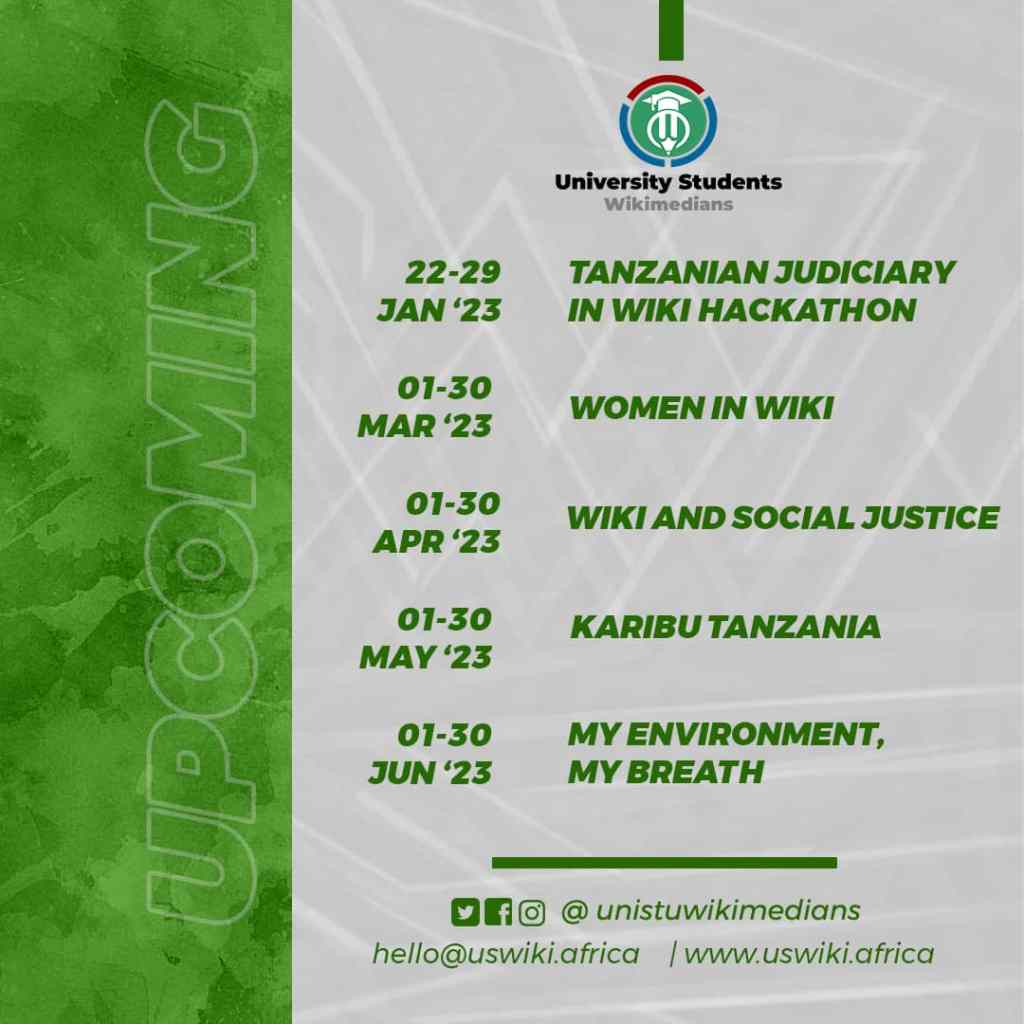Welcome to season 2 of the University Students Wikimedians Learning Series! This season, we will be focusing on the second term USW Wiki events for 2023, from January to June. These events are designed to provide students with the opportunity to learn about the power of Wikipedia and other Wiki projects and how they can be used to share knowledge and build community.
In episode 1, we will be focusing on the January event “Judiciary of Tanzania in Wiki“. This event was designed to give students a deeper understanding of the Judiciary of Tanzania and how it can be documented and shared on Wikipedia. We will be exploring the history of the Judiciary in Tanzania, its current structure and function, and the role it plays in shaping the country’s legal system. We will also be discussing the challenges and opportunities of documenting the Judiciary of Tanzania on Wikipedia and how we can improve the existing articles.
In episode 2, we will be discussing “Women in Wiki“. We will be exploring how women in Tanzania can use Wiki projects to share their stories, experiences, and perspectives. We will also be discussing the challenges and opportunities of documenting women on Wiki projects and how we can improve the existing articles.
In episode 3, we will be discussing “Wiki and Social Justice“. We will be exploring how Wiki projects can be used to promote social justice and raise awareness about important social issues. We will also be discussing the challenges and opportunities of documenting social justice on Wiki projects and how we can improve the existing articles.
In episode 4, we will be discussing “Karibu Tanzania“. We will be exploring the history, culture, and geography of Tanzania and how it can be documented and shared on Wiki projects. We will also be discussing the challenges and opportunities of documenting Tanzania on Wiki projects and how we can improve the existing articles.
In episode 5, we will be discussing “My environment my Breath“. We will be exploring the importance of protecting the environment and how Wiki projects can be used to raise awareness about environmental issues. We will also be discussing the challenges and opportunities of documenting the environment on Wiki projects and how we can improve the existing articles.
In episode 6, we will be discussing “Reading Wikipedia in the classroom in Tanzania“. We will be exploring how Wikipedia can be used as a learning tool in the classroom and how it can help students develop research and critical thinking skills. We will also be discussing the challenges and opportunities of using Wikipedia in the classroom and how teachers and students can make the most of this resource.
Each episode of this season promises to be engaging, informative, and thought-provoking. Join us as we explore these important topics and discover how Wikipedia can be used to share knowledge, build community, and promote social change. So, get ready to brush up on your Wikipedia skills, and join us on this exciting journey!
Impact
Some potential impacts that will be achieved include:
- Increased knowledge and understanding of the Judiciary of Tanzania, women in Tanzania, social justice, the history, culture, and geography of Tanzania, environmental issues, and how Wikipedia can be used as a learning tool in the classroom.
- Improved Wiki projects contents on the Judiciary of Tanzania, women in Tanzania, social justice, the history, culture, and geography of Tanzania, environmental issues, and how Wikipedia can be used as a learning tool in the classroom.
- Increased engagement and participation in Wiki editing and community building among university students in Tanzania.
- Development of critical thinking, research, and writing skills among university students in Tanzania.
- Increased awareness and understanding of the importance of protecting the environment and preserving the history and culture of Tanzania.
- Development of a new generation of Wiki editors and community builders in Tanzania who will contribute to the growth and development of Wikipedia and other Wiki projects.
- An increase in the number of articles and quality of articles in the language of Swahili will help to bridge the knowledge gap and make information more accessible to people in Tanzania.
- Finally, it will serve as a platform for the students to express themselves and share their knowledge and experiences which will in turn promote social change.
Overall, the University Students Wikimedians Learning Series has the potential to make a significant impact in terms of increasing knowledge and understanding, improving Wikipedia articles, and promoting engagement and social change.
Conclusion.
In conclusion, the University Students Wikimedians Learning Series is an exciting opportunity for university students in Tanzania, editors, wiki community handlers, or any other interested party to learn about and contribute to important topics related to the Judiciary of Tanzania, women, social justice, the environment, and more. We hope that you will join us in this journey and become a part of our community of passionate learners and knowledge sharers.
So, if you’re a university student in Tanzania or any other editor looking to expand your knowledge, improve your research and critical thinking skills, and make a meaningful impact in your community, then we invite you to take action and join us for the first episode of the University Students Wikimedians Learning Series. Don’t miss this opportunity to be a part of something bigger and make a difference!
Don’t just sit there and wait for an opportunity, be the opportunity! Sign up now and be part of the change. Together, let’s make Wiki projects a more inclusive, accurate, and reliable source of knowledge for all.
Write us an email at hello@uswiki.africa or reach us via WhatsApp at +255685261018. Connect with us on our social media platforms: Facebook, Instagram, Twitter, and LinkedIn

Can you help us translate this article?
In order for this article to reach as many people as possible we would like your help. Can you translate this article to get the message out?
Start translation
